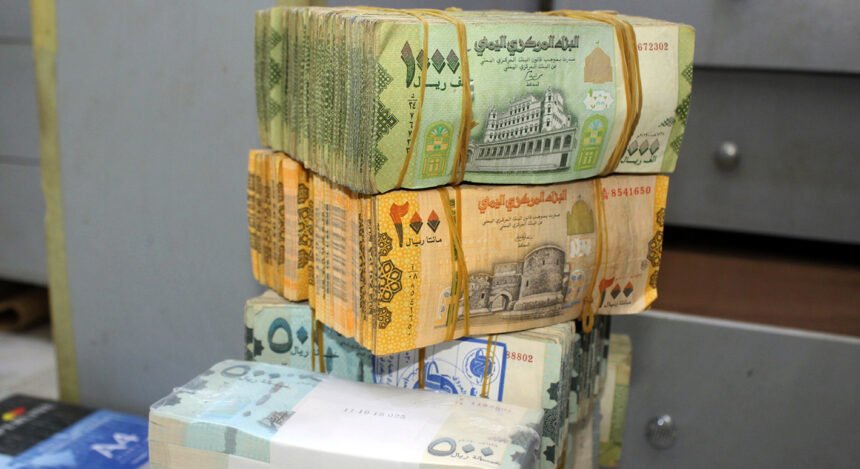In a press conference on March 30, the Houthi-controlled Central Bank of Yemen in Sana’a (CBY-Sana’a) announced its plan to circulate a new hundred-riyal coin. The bank assured the public that the new coin will not affect exchange rates or the Yemeni economy, as it is solely intended to address the problem of the damaged banknotes. The announcement was swiftly rejected by the government-controlled Central Bank of Yemen in Aden (CBY-Aden) who, in an announcement on April 2, decided to relocate all the major banking centers, including commercial banks, Islamic banks, and microfinance banks, from Sana’a to Aden. Shortly before, CBY-Aden had issued a directive prohibiting dealings with specified directive commercial banks in Sana’a, to which the CBY- Sana’a responded by issuing its own prohibiting all dealings with newly established banks in Aden.
Thus began the battle of Yemen’s banks. Financial and economic experts in Yemen, and international organizations alike, have condemned these reckless decisions, that could increase inflation rates, heighten the risk of the country’s economic collapse, and lead Yemen towards an uncertain future.
Local and international condemnation
The rollout of the new coin sparked widespread controversy among Yemenis on social media. Beyond the complexity that the new coin will generate, many described it as a nail in the coffin of the Yemeni economy. Critics noted that the bank in Sana’a has neither the ability nor the tools to print banknotes according to the international specifications and standards. In Aden, the central bank issued a strongly worded statement that described the Houthis’ coin launch as “unlawful” and denounced the new currency as a “counterfeit” designed to loot the assets of financial, banking, and commercial institutions and Yemeni citizens.
Internationally, the European Union expressed its deep concerns that the new coin would risk undermining the integrity of the banking sector, and could compromise Yemen’s adherence to international protocols aimed at combating money laundering and terrorist financing. Similarly, the US embassy issued a statement denouncing the issuance of counterfeit coins to replace Yemen’s legitimate currency, stressing that unilateral decisions of this nature will harm the wellbeing of the Yemeni people.
In turn, France condemned the issuance of counterfeit currency and expressed its firm opposition to an unlawful decision issued by an unrecognized party, noting the importance of unity at this critical moment in Yemen’s history. Britain followed suit, stating that “this measure threatens to destabilize the banking sector.” The Sana’a government not only disregarded all these condemnations, but considered them part of an international war waged on Yemen.
Years of War, Years of Collapse
In 2016, the transfer of the Central Bank of Yemen to Aden marked the beginning of a series of decisions that proved catastrophic to the Yemeni economy. The bank ordered the printing of various currency denominations which remained in circulation nationwide until the end of 2019. However, the Houthis prevented the use of this currency within the territories they controlled, branding it as counterfeit and illegal and confiscating it accordingly. Yemenis were left torn between an old and a new riyal, and financial transfers between the Yemeni regions under different governments were severely complicated.
To make matters worse, the CBY-Aden decided to relocate the headquarters of all banks from Sana’a to Aden, and gave only 60 days for the banks to comply with the threat of severe punitive measures—including potential exclusion from the SWIFT network and international money transfer services. This decision drew sharp criticism from many researchers and academics, who denounced it as hasty and likely to aggravate existing complications and deepen Yemen’s economic division. They cautioned against the adverse repercussions that could extend beyond the financial sector, impacting shareholders’ rights and ultimately destabilizing the Yemeni economy.
The future of the Yemeni currency and economy appears extremely grim. Many experts are concerned that the Houthi decision to issue a new currency is just a test to gauge reactions of the Aden government and the Yemeni people. They fear that this move could pave the way for further measures, such as legalizing electronic currency, printing banknotes, minting more coins, or a combination of these actions, which could result in a shift towards creating an alternative, independent economy— and potentially full economic separation within the same fragmented country.
If these fears materialize, internal tensions and conflicts could spiral out of control and lead Yemen into complete economic collapse. Unless a strong international intervention compels all conflicting parties to pursue peace, Yemen and its people will be doomed to a bleak economic future.




















